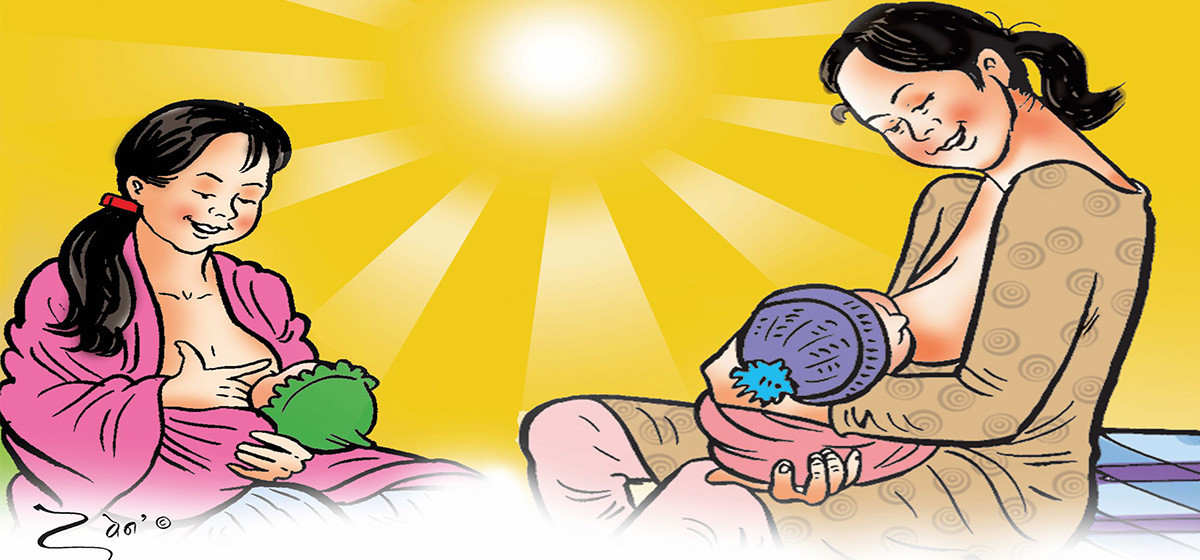All mothers should begin with the belief that their milk is adequate for their child. A child requires nothing other than breast milk till first six months
As the world is celebrating breastfeeding week with the theme “Breastfeeding: A Key to Sustainable Development” our sole concern in Nepal must be increasing the number of children who are exclusively breastfed until they are six months old.
Breastfeeding week carries more significance in Nepal as we are heading towards achieving better nutritional status of children and huge number of organizations along with the government have introduced and implemented various measures to create awareness among people to encourage them to breastfeed the children. However, we will be able to reach our goal only if we work together to implement this program.
Breastfeeding is still a big challenge in many parts of the country. I have heard and seen many children being deprived of exclusive breastfeeding even in urban areas. The problem with many mothers is that they are unable to produce adequate breast milk for their child or their milk is insufficient to fulfill child’s hunger even for the first three months of childbirth. It is worthwhile to dwell on why this problem persists among today’s mothers and how we can ensure children are not deprived of exclusive breastfeeding until they are six months old.
First of all, all mothers should believe that their milk is adequate for their child. This is how all mammals are raised. A child will require nothing other than breast milk till first six months. Second, a mother should not feel stressed while breastfeeding the child. Research has shown that any category of stress is associated with shorter duration of exclusive breastfeeding. Thus mothers should feed their child with a thought that their milk is going to fulfill child’s hunger and it is adequate enough. The family members should create a peaceful environment for a mother during lactating period. Our tradition also requires us to do so. We have a trend of sending daughter-in-laws to their mothers’ home, where they are better taken care of, after they have given births.
A mother should continue to let her baby suck the breast milk frequently—ten to 12 times a day—even if she thinks that her milk is not inadequate.
The production of milk is a hormonal control process which increases production as the baby keeps on suckling. Research has also proved that mothers who nursed their baby with breast milk for longer duration grow well motivated and strong, if they are also supported by their family, especially the husbands.
Some mothers give up hope when they fail to produce enough milk for their babies. They don’t need to be. As a matter of fact, there are some foods which help them increase breast milk production. The in-laws and relatives of new mother should encourage her to take as much as such food. Here are some.
Fenugreek (methi). Although there is little scientific evidence, soaked and germinated fenugreek seeds used in curry and plain pickle to feed mothers help them lactate more. An element called omega-3 fat found in fenugreek is good for baby’s brain development and is a good source of healthy vitamins. It has been used traditionally to feed lactating mothers to improve breast milk supply. Garlic is also said to help increase breast milk supply and has been found to be good for enhancing immunity of children.
There is a belief that green vegetables are not good and healthy for lactating mothers. So greens are forbidden in diets of lactating mothers. It is said consuming greens will lead both mother and child to catch cough and cold. This is only a myth. Greens such as spinach, fenugreek leaves and mustard greens enhance lactation.
Jeera (cumin), til (sesame), jwanu (aiwan), tulsi (holy basil) are good source of calcium, essential oils and vitamin B which enhance immune system and lactation.
While the above foods benefit the lactating mothers in a number of ways, it should be remembered that they should be used in diet only in moderate quantity. Besides, hydration is very important for a mother. The amount of fluids can be increased from vegetable soups, daal, fruit juices to compensate the fluid lost during breastfeeding. It is advised to take a glass of fluid every time you breastfeed.
It is always advisable to consult a dietician/nutritionist or a doctor when you feel your breast milk is insufficient for your baby. This can prevent your baby from being dependent on formula milk or bottle feed and thus from the frequent colds and hospital visits, diabetes and high blood pressure during later stages of life.
Prioritise Early Breastfeeding Support

The author is a nutritionist
pokharelpratik1921@gmail.com






































